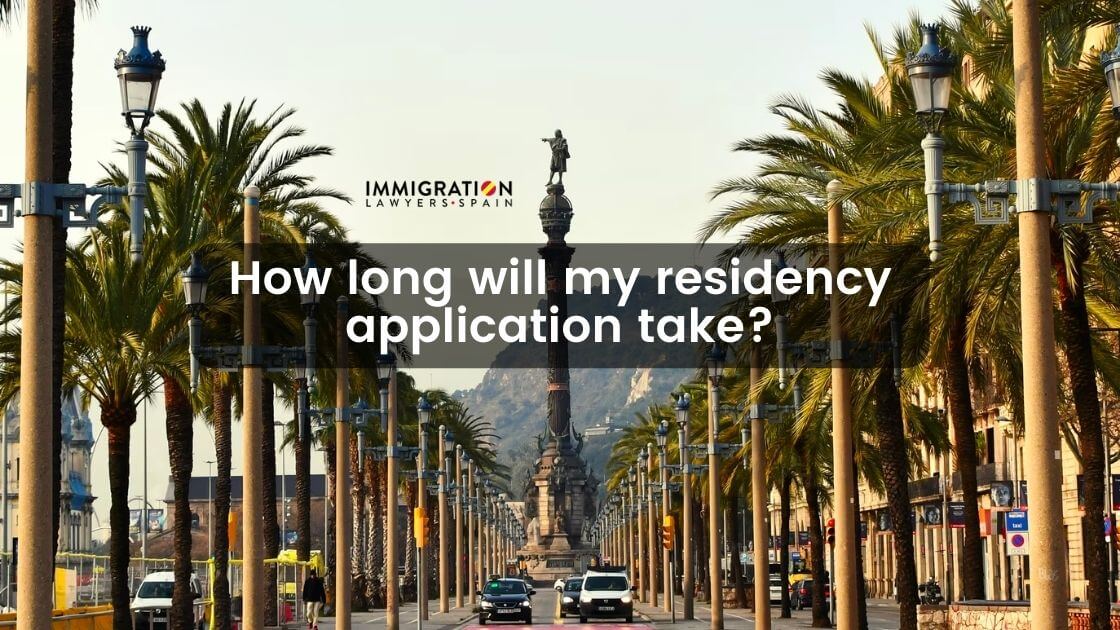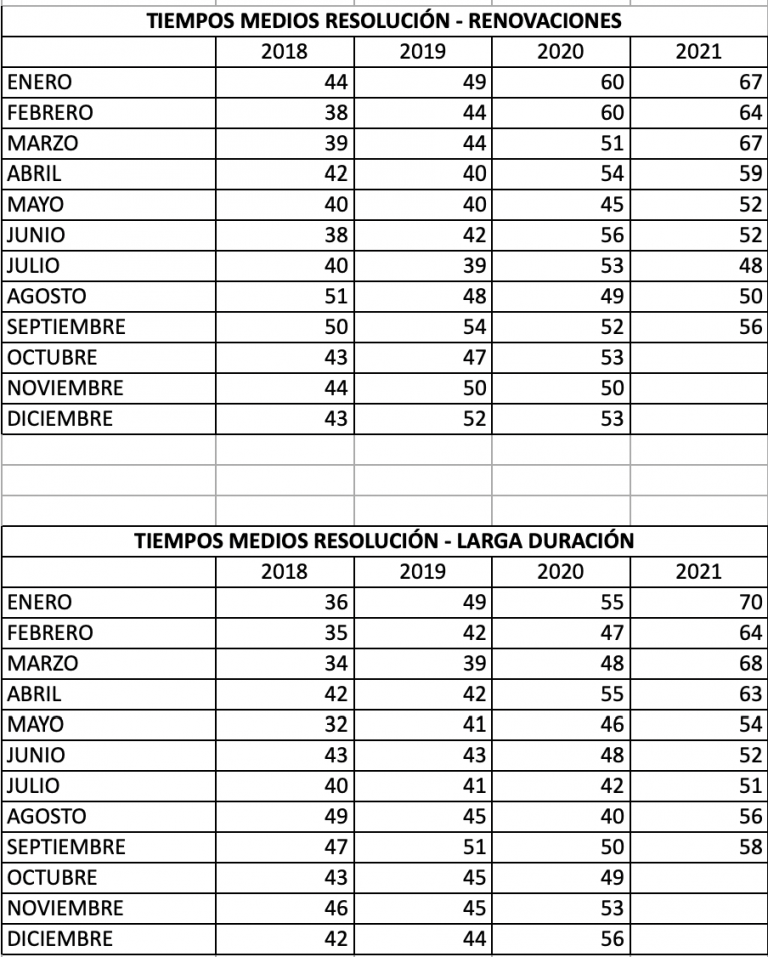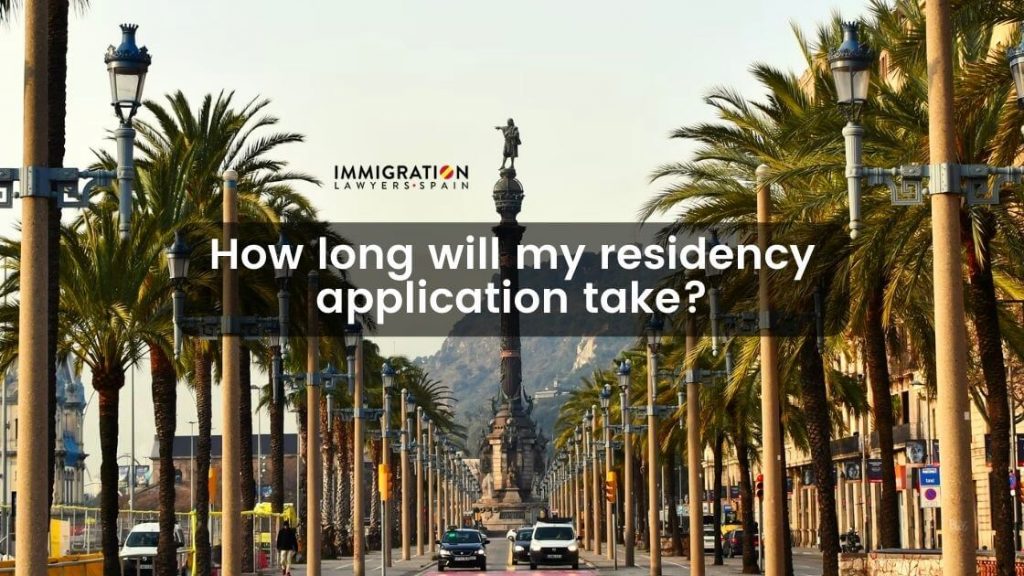
It is very likely that you have submitted or are about to submit your application for residency in Spain. Whether it is, for example, your application for arraigo, family member card, any type of work permit, or your residency renewal, one of the most common doubts among the foreigners is exactly how long it will take until their file is finally resolved.
Thus, in this article we will find out precisely how long it takes for the immigration office to issue a favorable response, if this wait will always be the same and what can affect it, and a crucial tip to reduce waiting times
Content
ToggleHow long does it take for the immigration office to respond to my application?
The quick answer is that the Immigration Office has a maximum period of 3 months to resolve your application and issue a response, the count starting the day after the date on which your file was received by the Registry for processing.
This information can be found on the official website here.
But, as in many situations, there are many nuances to this response (and as we will see in the next section, nowadays these 3 months do not seem to matter much and are usually not taken into consideration if we are to get a clear idea). Let’s look at it in detail.
First of all, we must understand that the Foreigners’ Office is governed by Law 30 of the Legal Regime of Public Administrations to resolve applications for residence in Spain.
This is the same regulation that specifies this maximum period of 3 months to issue a resolution.
This response, as is logical, can be favorable (we have been granted residency) or denied (there is a requirement to be fulfilled that was missing, and our application has been rejected).
But, what happens if we have not received any type of response after this period?
If you have not received a response after 3 months, there are two different possibilities:
- If the application you have made is for an initial card, then it will be considered as denied by negative administrative silence. That is to say, the lack of response within 3 months is equivalent to a rejection of the application.
- But, on the other hand, if the application is for a renewal of your residency, then by positive administrative silence the application would be approved in the absence of a response within three months.
What can I do after these 3 months if I have not received any response?
Although the above is true at the legal level, we must make an important caveat here that may come as a great relief to you.
For it is now possible that even if you do not receive a response within three months, your application may still get approved at the end.
Let’s take a step back first.
If we follow what the regulation says, your initial application for residency (to get the arraigo, community card, etc.) would effectively be rejected if after 90 days you have not received any notification.
In such cases, and if you do not agree with the decision, you would have 1 month to file an appeal for reconsideration, or 2 months to file an administrative contentious appeal.
Here you can find an article with all the details on how to proceed.
However, and here comes the good news: this may not be necessary. In fact, in general, filing an appeal is not the best option after no response: waiting for the administration’s response is.
This is because the administration is currently experiencing long delays in resolutions.
Thus, we have seen cases in which after 5 or 6 months of submitting the application without a response (according to the law, the file should have been rejected), the immigration office has finally approved the residency.
To give you an idea of the magnitude of the situation, here is a table showing how long it has taken the immigration office, on average, to resolve cases in recent years:

Therefore, although the general rule establishes that the negative administrative silence is applied after 3 months in initial applications, currently this may not be true due to the delays experienced by the foreigners’ office.
In conclusion, do not take this 3-month period into account. Analyze how long the applications for your type of residency are currently taking, and wait that time until you receive a resolution (favorable or unfavorable).
Do you have any doubts? Keep reading for more information, or ask our expert lawyers anything:
Waiting times depending on the immigration office where you submitted your application
If we follow the logic of what we have seen so far, it is easy to understand that in practice the actual time it will take for your file to be resolved depends on the workload of each immigration office.
Thus, we find large discrepancies between one office and another, with very different resolution times for the exact same procedure.
Which immigration offices experience the longest delays and take the longest to issue a resolution?
Those with a greater number of files to process, due to a greater number of foreigners.
We are talking about offices located in large cities, such as Madrid, Barcelona, Alicante or Murcia.
And, unfortunately, you cannot file in a different office than the one that corresponds to you based on where you are registered and live regularly in Spain.
Resolution time for visas under the Entrepreneurship Law
Everything we have seen so far is true for residences under the general immigration regime.
However, the reality is totally different for permits under the Entrepreneurs Law (entrepreneur visa, investor visa, work permit as a highly qualified worker, etc.).
In these cases, the resolution period is 20 days (not counting Saturdays, Sundays, or holidays), and since it is the UGE and not the immigration office that analyzes each file, these times are usually met to what’s scheduled.
In addition, if no response is received after these 20 days, the application will be approved by positive administrative silence (something completely opposite if comparing with applications under the general regime, which, as we have seen, operate with negative silence).
How to speed up the waiting time for your residency authorization
Is it possible to take any action to reduce waiting times?
Unfortunately, the answer is no.
Once you have your file properly prepared and send it to the immigration office, there is no strategy you can follow to make the administration issue a response faster.
If the public officials working with each file are overworked by the large number of applications they receive, they will take as long as they need to resolve them all, and no immigration lawyer can do anything to expedite this.
However, what is certain is that you can make the overall process go much faster.
How?
Basically, by reviewing the requirements very carefully, and making sure that you meet them all correctly before submitting your application.
Because many times the foreigner has to wait extra time because she has left some document behind, or has not submitted her file properly, and this means that the administration initiates a requirement, creating an extra step in the process and therefore a longer overall delay.
Thus, having the requirements under control and making sure that you meet them as required by the immigration law is the best advice we can give you for a much faster resolution.
In these cases it is best to rely on an immigration lawyer to review everything for you and submit the application on your behalf, benefiting from the experience of someone who has previously filed many cases like yours and knows perfectly what mistakes should not be made.
At ImmigrationSpain we can help you get a favorable resolution in the most comfortable way possible. Contact us below and let our lawyers advise you step by step.
Get in touch with our lawyers and let us guide you step by step:





